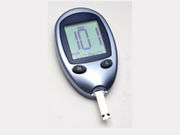In-trial reduction in risk of ESKD seen in ADVANCE trial persists after 9.9 years of follow-up
TUESDAY, March 29, 2016 (HealthDay News) — For patients with type 2 diabetes, intensive glucose control has long-term benefits for preventing end-stage kidney disease (ESKD), according to a study published online March 22 in Diabetes Care.
Muh Geot Wong, M.D., Ph.D., from the University of Sydney, and colleagues examined the long-term effects of intensive glucose control on the risk of ESKD and other outcomes in survivors of the Action in Diabetes and Vascular Disease: Preterax and Diamicron Modified Released Controlled Evaluation (ADVANCE) trial. A total of 8,494 ADVANCE participants, who had previously been randomized to intensive or standard glucose control, participated in a post-trial follow-up.
The researchers found that by the first post-trial visit, in-trial hemoglobin A1c differences disappeared. After 9.9 years of overall follow-up, the in-trial reduction in the risk of ESKD (seven versus 20 events; hazard ratio, 0.35; P = 0.02) persisted (29 versus 53 events; hazard ratio, 0.54; P < 0.01). Greater effects were seen in earlier-stage chronic kidney disease (P = 0.04) and at lower levels of baseline systolic blood pressure (P = 0.01). The glucose lowering effects on death, cardiovascular death, or major cardiovascular event risks did not vary according to levels of kidney function (P > 0.26).
“Intensive glucose control was associated with a long-term reduction in ESKD, without evidence of any increased risk of cardiovascular events or death,” the authors write. “These benefits were greater with preserved kidney function and with well-controlled blood pressure.”
Several authors disclosed financial ties to the pharmaceutical industry; the ADVANCE trial and ADVANCE-ON follow-up study were partially funded by grants from Servier.
Copyright © 2016 HealthDay. All rights reserved.








